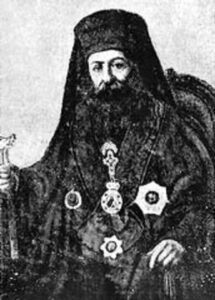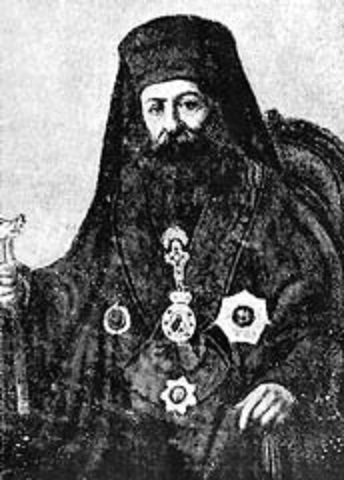
In 1868, the Roman Catholic Church was making preparations for the first Vatican Council, which would go on to proclaim papal infallibility to be a dogma. Ahead of the council, Pope Pius IX sent invitations to the Orthodox patriarchs, attempting to summon them to participate. Italian newspapers got hold of the letter before it was delivered, so Ecumenical Patriarch Gregory VI knew what it said – and he wasn’t impressed. When a papal delegation visited Constantinople and attempted to deliver the pope’s invitation, Gregory refused to open the envelope.
“Inasmuch as this letter of convocation has already been published in the newspapers,” Gregory told the envoys, “we have learned what are the principles of His Holiness – principles diametrically opposed to those of the Orthodox Church of the East.” And so, said Gregory, there was no point in opening the letter, “which only repeats the same principles, contrary to the spirit of the Gospel, and to the doctrine of the Ecumenical Councils, and of the Holy Fathers.”
But Patriarch Gregory wasn’t finished, and he and the papal representatives had an extended discussion. “Without entering into particulars,” he concluded, “we say that as long as the Church of the Saviour shall stand upon earth, we cannot admit that there is in her bosom a Bishop Supreme other than our Lord Himself; or that there exists an infallible Patriarch, who can speak, ex cathedra, superior to Ecumenical Councils – to which Councils alone belongs infallibility, because they have always conformed to the Sacred Scriptures and apostolical tradition. Nor can we admit that the Apostles were unequal, inasmuch as they were all illuminated by the Holy Ghost up to the same measure; or that to this or that Patriarch a precedence has been given, not by any synodal or human resolution, but by right Divine, as you assert.”
The Pope also sent an invitation to the Patriarch of Alexandria. My source for this is a newspaper dated July 29, 1869, which puts us right in the middle of an Alexandrian succession crisis, so I’m not 100 percent certain which man was given the invitation – most likely, it was Patriarch Nikanor. The Alexandrian Patriarch’s response to the papal envoys was basically the same as Patriarch Gregory’s: refusal to accept the hand-delivered invitation and a stinging rebuke of papal claims.
The Patriarch of Alexandria opened by raising three issues: Rome’s denial of the equality among all the churches; its claims of exclusivity; and its new (1854) dogma of the Immaculate Conception of Mary. “But why pursue the subject further?” the Patriarch went on, “If the Holy Pope of Old Rome sincerely desires the pacification and unity of the whole church of Christ, then let him as a brother, and as an equal among equals, put himself in communication with the other holy Patriarchs…”
The Roman Catholic bishop of Alexandria responded with a company-line answer: “The Holy Father summons this council as head and sovereign over our church, a successor of the blessed Apostle Peter; but I am not come to discuss.” The Patriarch had none of it: “Be it so; but we do not yield to such pretences, which are at variance with the received teaching of the church, of which Christ only is the head.” The Roman Catholic bishop couldn’t resist an argument. “But you know that your church is the see of the Apostle Mark, who was consecrated Bishop of Alexandria by the blessed Peter. Besides, did not the great Athanasius appeal to Rome?”
The Patriarch was fired back, “If the Bishop of Rome boasts of St. Peter, he of Antioch has a still better right to do so, Peter having taught and acted as Bishop there before he did at Rome. The consecration of St. Mark by Peter makes no difference, for all the apostles were equal in authority and dignity. Again, if Athanasius appealed to the Bishop of Rome, it was when he was under persecution, and as a suffering brother to one able to help him – not to a superior.”
The Roman Catholic bishop, seeing that he was making no progress in convincing the Patriarch to accept the papal invitation, tried a different tack. “For such an end as unity should you not be a little less precise, and not stand so much on your dignity?” To this, the Patriarch responded, “No; this is not a question of a form, but a most important principle. But not to prolong this discussion let me repeat once, and for all, that as this new attempt on the part of his Holiness the Pope has miscarried, it is necessary, if he sincerely desires the unity of the Universal Church that he should write to the patriarchs individually, and acting in concert, endeavor to come to an understanding with them respecting the course to be adopted – renouncing every dogma on which opinions may clash in the church. By so doing his efforts might perchance be crowned with some degree of success.”
The debate ended there; the papal envoys and the Patriarch exchanged pleasantries and ended their meeting. The envoys left carrying the unopened papal invitation.
Sources: “Pope and Patriarch,” New York Observer and Chronicle (January 21, 1869), 3; “The Pope and the Patriarch,” Queanbeyan Age (July 29, 1869), 1; A. Edward Siecienski, The Papacy and the Orthodox: Sources and History of a Debate (Oxford University Press, 2017), 354 and Fairey, The Great Powers, 179.

Leave a Reply